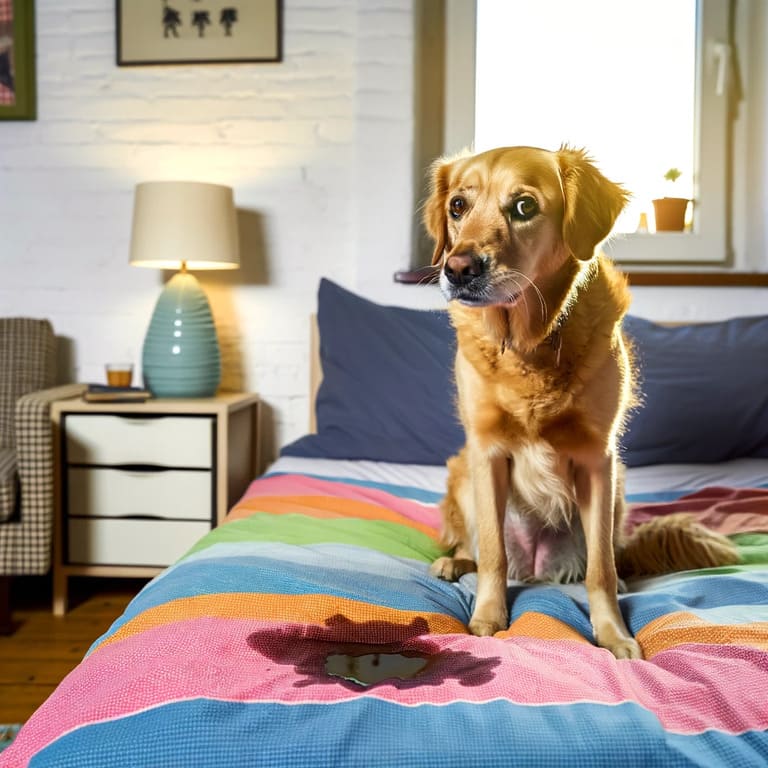When you discover your beloved canine companion has taken to urinating on your bed, it can be both baffling and frustrating. This behavior, while surprisingly common, often leaves pet owners perplexed and seeking answers. Understanding why dogs engage in this unexpected behavior is not just about safeguarding your bedding; it’s a crucial aspect of comprehending your pet’s health and psychological well-being. In this article, we delve into the various reasons that can drive dogs to pee on beds, exploring everything from territorial instincts to underlying medical conditions. By shedding light on this peculiar behavior, we aim to provide dog owners, pet lovers, and the curious alike with the knowledge to better understand and address this challenging aspect of pet ownership.

Reasons Behind the Behavior
Understanding why dogs urinate on beds requires a dive into various potential causes. Each reason provides a different perspective, from instinctual behaviors to health-related issues, that can help pet owners address this undesired habit effectively.
Territorial Marking
Dogs, by nature, are territorial animals. In the wild, canines mark their territory as a way to communicate with other animals. This behavior can carry over into the home environment. Your dog may consider your bed as a significant part of their territory, especially since it carries your scent strongly. By urinating on your bed, they might be attempting to intermingle their scent with yours, reinforcing their presence in what they perceive as a shared territory.
Medical Issues
Before jumping to any behavioral conclusions, it’s crucial to rule out medical causes. Conditions like urinary tract infections, bladder stones, or incontinence can lead to inappropriate urination. Older dogs, in particular, may struggle with controlling their bladder functions due to age-related health issues. A sudden onset of bed-wetting in a previously house-trained dog is a strong indicator that a trip to the vet is necessary.
Behavioral Issues
Psychological factors can’t be overlooked when it comes to pets. Dogs experiencing anxiety, stress, or past trauma might urinate on beds as a coping mechanism. Changes in the household, such as a new pet or family member, or even the absence of a loved one, can trigger such responses. Additionally, past negative experiences, particularly in rescued dogs, can manifest in various forms, including this unwanted behavior.
Lack of Training
Sometimes the root cause is as simple as incomplete or improper house training. If a dog hasn’t been thoroughly trained to understand that urinating indoors is unacceptable, they might choose the bed as a spot due to its comfort and the owner’s scent.
Seeking Attention
Dogs are intelligent and emotionally aware creatures. Some may learn that urinating in certain places, like their owner’s bed, elicits a strong reaction and, consequently, attention. Whether it’s negative or positive, to a lonely or bored dog, any attention might be preferable to none.
Impact on Pet and Owner
Navigating the Health and Emotional Consequences
Health Implications: The act of a dog urinating on a bed can have several health ramifications. For the dog, if the behavior is due to a medical condition like a urinary tract infection, it could lead to more serious health issues if left untreated. For the owner, it’s essential to consider the hygiene concerns. Urine can harbor bacteria and, if not cleaned properly, can pose a risk to human health, especially in households with young children or immunocompromised individuals.
Emotional Impact: Beyond the physical health concerns, the emotional toll on both the pet and the owner cannot be overstated. Owners may feel frustration, confusion, and even anger towards their pet, affecting the bond they share. It’s crucial to approach this issue with understanding and not punishment, as negative reactions can exacerbate the problem, especially if the cause is behavioral or medical. For the dog, repeated scolding or punishment for something they might not control can lead to increased anxiety and stress, potentially worsening the behavior.
table of content ↑Prevention and Solutions
Addressing the Issue with Effective Strategies
Veterinary Check-Up: The first step in addressing this issue is to rule out any medical problems. A thorough veterinary examination can identify or eliminate health issues like urinary tract infections or bladder stones. Early diagnosis and treatment can not only stop the behavior but also prevent more serious health complications for your dog.
Behavioral Training: If the issue is not medical, behavioral training is key. Consistency and patience are crucial. Reinforce house training principles, and consider crate training as a temporary measure. Positive reinforcement, rather than punishment, should be the cornerstone of any training approach.
Environmental Management: Sometimes, managing your dog’s environment can help curb this behavior. Restricting access to the bedroom or the specific bed when you can’t supervise might be necessary. Additionally, ensuring your dog has regular bathroom breaks and a comfortable, designated spot for elimination can also be helpful.
Professional Help: If you’re struggling to manage this behavior, don’t hesitate to seek professional advice. A veterinarian or a certified pet behaviorist can provide tailored advice and strategies based on your specific situation, which can be incredibly beneficial in resolving the issue.
table of content ↑Conclusion
Embracing Understanding and Patience in Addressing Pet Behavior
Discovering the underlying reasons why dogs pee on beds is more than just solving an inconvenience; it’s about understanding and empathizing with our canine companions. Whether driven by territorial instincts, medical issues, behavioral challenges, or simply a cry for attention, each case requires a thoughtful and patient approach. It’s crucial to address these issues with a blend of veterinary insight, consistent training, and environmental management. Remember, punishment is never the solution; instead, fostering a supportive and understanding environment is key to resolving these issues. By taking these steps, we not only protect the health and well-being of our pets but also strengthen.
table of content ↑References
- Coren, Stanley. “Why Does My Dog Act That Way?: A Complete Guide to Your Dog’s Personality.” Simon and Schuster, 2006.
- A comprehensive guide by a renowned psychologist and dog behaviorist, providing insights into various canine behaviors.
- Horwitz, Debra F., and Gary Landsberg. “BSAVA Manual of Canine and Feline Behavioural Medicine.” British Small Animal Veterinary Association, 2009.
- An essential text for veterinarians and pet behaviorists, discussing medical and behavioral issues in pets.
- Beaver, Bonnie V. “Canine Behavior: Insights and Answers.” Elsevier Health Sciences, 2009.
- A detailed book offering veterinary perspective on canine behavior, including issues such as inappropriate urination.




